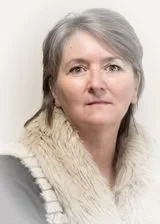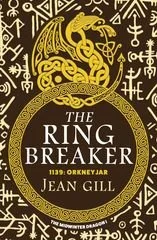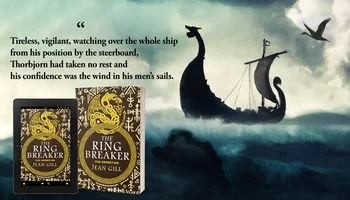SPFBO 9 Author Interview- Jean Gill
What inspired you to write your SPFBO entry? Is there a particular story, personal experience, or idea that sparked this book?
Some ‘meant-to-be’ urge took me to remote Orkney in 2018 for a few days of soul-time and to take photographs. When I dutifully visited the Maeshowe neolithic tomb, I expected very little connection as my obsession is 12th century history. I did not expect to be in a dark, stone age burial chamber surrounded by hundreds of Viking runes. 12th century runic graffiti carved on every wall by MY Vikings, who’d made a brief appearance in Narbonne in my novel Song at Dawn when they were on pilgrimage from Orkney to Jerusalem. I swear I could see them all, sheltering from a storm in Maeshowe, especially the anonymous man who carved the exquisite dragon into the rock. Except that he wasn’t anonymous to me. I knew everything about the gods-touched nature of his birth and of how the dragon came to him. And I knew who the red-haired woman in the tomb was, the one who looked only at him. She was not anonymous. She carved her name, Hlif, and her job ‘the jarl’s house-keeper’, below her message in the wall. You will see Hlif’s runes and the carved dragon if you visit Maeshowe but you will only discover the magic of the story behind them if you read The Ring Breaker.
The dragon spoke to me and I had to write the story of Skarfr, ‘the cormorant’.
How would you describe your writing process? How did it evolve during the creation of this book?
In a word – slow. Which suits my books and my life. This is my 25th book since 1988 and I want each one to be the best I can make it so you won’t find me ‘rapid publishing’. I rarely write more than 1,000 words at a time, maximum 2,000 or I’m exhausted and incoherent. Believe me, I’ve reached an age where that’s a bad look. I always finish a writing session knowing what comes next in the story, so I’m raring to go when I sit down again – no writer’s block.
I don’t plan other than a rough idea of the story, I hate editing and I prefer to let the writing flow, get it written THEN get it right.
I live in the south of France now, so I can often take my ipad (with attached keyboard) out into the garden and write outdoors while my mad pointer runs around chasing butterflies. That’s my favourite way to work.
This book was different because I’ve used events and historical characters from The Orkneyinga Saga as the history underlying my story. However, apart from its unreliability as history, the saga is not storytelling as we know it. It’s mostly a sequence of events, with brief descriptions of key characters. I find it a big constraint and challenge to start with the skeleton of history and hide those bare bones in an adventure that’s magical, rich and about real people.
What challenges did you face during the writing or publishing process, and how did you overcome them?
So many… the first one was the implicit message on my English Literature degree course that dead white men wrote literature – not someone like me. Reading widely dinted that notion: Stevie Smith, Doris Lessing, Colette…
Self-doubts. Was I any good? At some point you have to go public to find out and, shaking, aged 31, I read my poems at an open mike ‘Poems and Pints’ evening. The two guys running it asked me to join them and so as West of Whitland Poets we did library and school gigs. Teachers by day and rock stars when called upon…
Never quite finding the editor and publisher of my dreams though learned a bit along my small press publishing experience. Then came self-publishing. I love it.
Who are your biggest literary influences and how have they impacted your writing style?
I aspire to these characteristics of two authors I’ll mention but my writing has been shaped by every author who’s had tea in my house or chatted online; and all those dead or alive, whose books I’ve read.
G G Kay. His deep historical research underpins all his recent novels (even though he changes names), his style is lyrical and he has a sense of one person’s impact on the sweep of history. His epic moments are memorable.
Dorothy Dunnett. I wrote a tribute for her centenary this year so I’ll quote from it. Most of all, Dunnett can deliver a knife in the guts. The villain turns out to be damaged himself – or herself. So near escape or so near redemption, doomed by a twist of fate. A happy ending for one character comes with a price for another. In my novels too, betrayal twists that knife, and you can never be sure anyone is safe.
How do you approach world-building in your fantasy novel? What elements do you think are essential for a compelling fantasy setting?
As this is historical fantasy/ fiction set in 12th century Viking Orkney, the world is based history of that period but I also set store on re-enactment and the genius of youtube. I watched the voyage of the Sea Stallion (a reproduction Viking ship) and many bouts of glima wrestling – so good for background. I even bought a sunstone so I could try out navigation with one. I can find my way around the garden now.
I research for a year before I start writing the novel and although I had researched the 12th century in depth for the Troubadours books, I only knew popular history regarding Viking culture and I knew little about Orkney so needed to immerse myself in reference books and videos. I love research.
If you could give a piece of advice to the main character in your book at the start of their journey, what would it be?
Trust the cormorant.
As a self-published author, how do you navigate marketing and promoting your work?
With my sunstone 😊 No seriously. with the help and support of the Indie writers’ community. I have a close inner circle of writer-friends and ever-increasing wider circles of authors and readers. A support galaxy, all spinning around me!
As to what marketing and promotion I actually do: I keep up to date via my networks as to what’s working at the moment and I prioritise what I enjoy. I like chatting on fb and I like writing my monthly newsletter. I don’t mind running some ads and I enjoy creating videos and still ads, As a photographer, I enjoy making pictures so could spend all day playing with pictures and text – it’s creative - but analysis and optimisation is not my thing, so I’m careful with budget.
I like reading my work and talking about it but I’m shy about videoing myself so am dipping my toe in with voice-overs on my youtube channel rather than live video. I don’t like looking at me so why should anyone else?
I hate the idea of sharing my daily life via phone so that’s out. Tik Tok Not.
My author self is a kind boss to my marketing self and mostly lets her have fun.
What made you decide to participate in the SPFBO competition? How do you think this experience will benefit you as an author?
As a reader, I am in heaven, discovering new books and new authors, thanks to first class reviews that point me towards books I might like. As an author, I get to hang out with some really interesting people who are passionate about books. Networking and support last long after books are cut from the contest, if you participate. I learn from the bloggers’ debates on genres, on marketing choices, on what works for them and what doesn’t.
If you were to win SPFBO, what impact do you think this would have on your writing career?
It would be rather nice.
Let me rephrase that.
IT WOULD BE A GAME-CHANGER! I would be the Dark Queen of my fantasy universe. In someone else’s eyes.
What's next for you after SPFBO? Are there any upcoming projects you can share with us?
I’m writing Among Sea Wolves, Book 2 of the Midwinter Dragon and it was such a relief to thump some fellow-Vikings and sail away from Grimsby on my dragon-ship.




